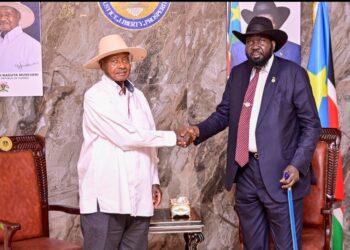The Constitutional Court presided over by a Coram of five judges has unanimously annulled section 25 of the Computer Misuse Act 2011 and its enforcement with immediate effect.
While delivering their ruling on Tuesday all five Judges Justice Richard Buteera, Justice Kenneth Kakuru, Justice Geoffrey Kiryabwire, Lady Justice Elizabeth Musoke and Lady. Justice Monica Mugenyi agreed that section 25 was unjustifiable since it curtails the freedom of speech in a free and democratic society.
The Petition was brought before the Constitutional Court in 2016 by city lawyers Andrew Karamagi and Robert Shaka challenging Section 25 of the Computer Misuse Act.
The petitioners alleged that Section 25 of the Computer Misuse Act, which declares that it’s an offence for any person to “willfully and repeatedly use electronic communication to disturb or attempt to disturb the peace, quiet or right of privacy of any person with no purpose of legitimate communication” is inconsistent with and in contravention of Article 29(1)(a) of the country’s Constitution.
Meanwhile, Article 29(1) (a)states that; Every person shall have the right to freedom of speech and expression, which shall include freedom of the press and other media:
Therefore in their petition, the petitioners wanted the court to declare that; An impugned Section is an insidious form of censorship which restricts the free flow of opinions and ideas essential to sustain the collective life of the citizenry in the digital age. That it is vague and overly broad, and there is no evidence that government could not achieve the intended purpose with less drastic measures.
In his affidavit, lawyer Karamagi informed the court that the impugned Section is also vague because it fails to give proper notice of the conduct it seeks to proscribe and terms such as “disturb or attempt to disturb the peace, quiet or right of privacy” are not defined in the Act, and cannot be conclusively defined by a regular user of the Internet. As a result, the police and governmental authorities will arrest and prosecute otherwise confused citizens in an arbitrary and whimsical manner.
While making his ruling Justice Kakuru asserted that in a democratic and free society, prosecuting people for the content of their communication is a violation of what falls within the guarantees of freedom of expression in a democratic society.
Giving an example of the European Court of Human Rights case of Handysida v UK (References: 5493/72, (1976) 1 EHRR 737, [1976] ECHR 5, he said that it was observed that freedom of expression includes the right to say things that; offend, shock or disturb the state or any sector of the population. he added that the European Court concluded that instituting prosecution in such cases would not be appropriate.
Justice Kakuru also explained that The United Human Right Committee in its general comment 34, stated that any limitation on freedom of expression must be absolutely necessary. ‘According to the United Nations special rapporteur on freedom of expression, States are only permitted to prohibit it through criminal section only for four types of expression under International law. They are child pornography, direct public incitement to genocide, advocacy of national, racial, and religious hatred that constitutes incitement to discrimination, hostility or violence and incitement to terrorism
“I find that the impugned Section is unjustifiable as it curtails the freedom of speech in a free and democratic society. Secondly, Section 25 of the Computer Misuse Act No. 2 of 2011 does not specify what conduct constitutes offensive communication. To that extent it does not afford sufficient guidance for legal debate,” he said.
The judge also agreed that the section in question is vague, overly broad and ambiguous. Therefore, he found that the impugned section is inconsistent with and/or in contravention of Article 29 (1,) of the Constitution, Article19 (2) of the International Covenant on Civil and Political Rights and Artcle9 (2) of the African Charter on Human and Peoples’ Right.
“I would allow the Petition with costs to the petitioners and make the following declarations and orders: 1. Section 25 of the Computer Misuse Act No. 2 of 2011 is null and void as it is inconsistent and/or in contravention with Article 29 (l) of the Constitution. 2. The enforcement of Section 25 of the Computer Misuse Act No. 2 of 2011 is hereby stayed,” he ruled.
Justice Kakuru’s ruling was seconded by all Judges and allowed the Court declarations and orders as they were proposed by Justice Kakuru.
Do you have a story in your community or an opinion to share with us: Email us at editorial@watchdoguganda.com













